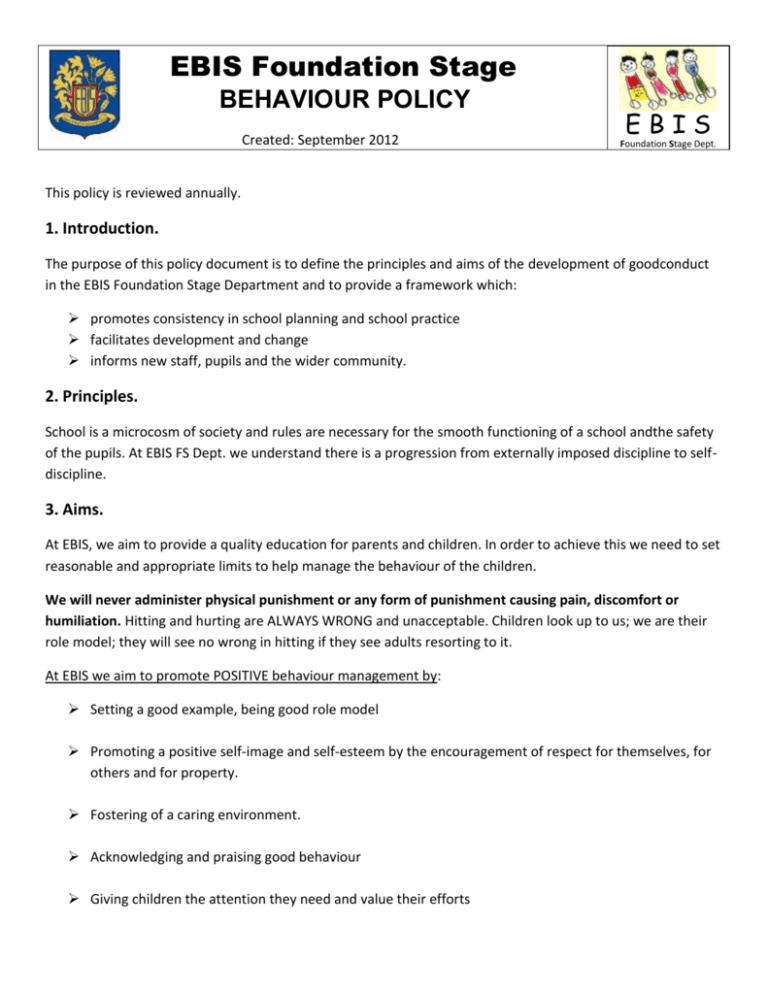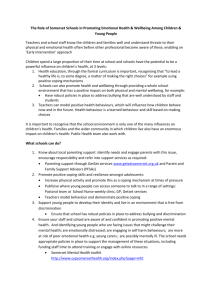1. Introduction.
advertisement

EBIS Foundation Stage BEHAVIOUR POLICY Created: September 2012 EBIS Foundation Stage Dept. This policy is reviewed annually. 1. Introduction. The purpose of this policy document is to define the principles and aims of the development of goodconduct in the EBIS Foundation Stage Department and to provide a framework which: promotes consistency in school planning and school practice facilitates development and change informs new staff, pupils and the wider community. 2. Principles. School is a microcosm of society and rules are necessary for the smooth functioning of a school andthe safety of the pupils. At EBIS FS Dept. we understand there is a progression from externally imposed discipline to selfdiscipline. 3. Aims. At EBIS, we aim to provide a quality education for parents and children. In order to achieve this we need to set reasonable and appropriate limits to help manage the behaviour of the children. We will never administer physical punishment or any form of punishment causing pain, discomfort or humiliation. Hitting and hurting are ALWAYS WRONG and unacceptable. Children look up to us; we are their role model; they will see no wrong in hitting if they see adults resorting to it. At EBIS we aim to promote POSITIVE behaviour management by: Setting a good example, being good role model Promoting a positive self-image and self-esteem by the encouragement of respect for themselves, for others and for property. Fostering of a caring environment. Acknowledging and praising good behaviour Giving children the attention they need and value their efforts Listening to what they want and have to say Helping pupils recognise socially acceptable behaviour. Guiding children towards eventual self-discipline by encouraging them to increasingly take responsibility for and accept the consequences of their actions. Having the minimum of rules, make them clearly and easy for them to understand. 4. Strategies for the Development of Good Conduct. PSED provides opportunity to encourage, develop and reinforce general good behaviour and to encourage children to begin to take responsibility for their own actions. We always try to understand the reason behind the negative behaviour; there is always a reason for children to misbehave. We do not think of the child as being wrong, rather, it is the behaviour that is wrong. Our strategies encourage self-esteem by giving praise, positive comments and stickers/rewards for good behaviour. 5. Strategies for coping with behavioural problems We follow the ‘Problem Solving Steps’ strategy to help children and adults resolve conflicts and emotional or social issues as follow: 1. Approach Calmly Breathe. Place yourself between the children on their physical level. Use a calm voice and gentle touch. If an object is involved in the conflict say something like "I'm going to hold this while we talk about the problem" 2. Acknowledge Feelings Give recognition to the feelings children are expressing by using simple descriptive words. For example" You look upset and ……. you look upset" Make sure the children have 'emptied out' their feelings before moving on to the next stage. 3. Gather Information Ask the children open ended questions that will help you find out what exactly the problem is. Questions like "What's happening?" or "What's the problem?" or "What's going on?" are useful at this stage. Repeat children's words back to them to help them clarify their thoughts. 4. Restate the Problem Say exactly what the problem is. Use words like "So the problem is….." Use the needs and details the children have described. 5.Ask for ideas for Solutions and Choose one Together Say something like "What do you think we can do to solve this problem? “Listen and let the children come up with their own ideas. Respect and explore all of the ideas even if some of them seem unrealistic. If children say they can 'share' explore this idea further so that everyone is clear how the sharing will happen. 6. Be Prepared to Give Fallow Up Support When children have reached a solution check that they are both Ok with it. Summarise what is going to happen by saying something like "so you're going to…. and you’re going to….." Then acknowledge that the children have solved their problem by sayingwords to the effect of "You did it!You solved the problem!" This helps to build children's confidence in their capabilities as problem solvers. 5. School recording and monitoring procedure • Minor issues are usually dealt with by form teachers or other members of staff where appropriate. Each issue is dealt with on an individual basis. The teacher makes note of it in the link book to inform parents if judged necessary. Teachers mustalso record the incident in the classroom accident/incident record book judged it necessary. • Issues of an on-goingnature that are disruptive and or consistently failing to reach our levels of expectations should always be recorded in the incident book and be discussed with the Head of FS. Parents will eventually be asked to meet with the FS head and teacher to discuss relevant strategies. Observation by the school SENCO may become relevant. • Major issues. Teacher should go to the nearest available Senior Management to deal with the situation. Parent/carer must be informed immediately by phone. Record in the accident book is essential. [Records in the incident/accident book should, when possible, be signed by witnesses as well as by parents] 6. Biting Biting can be an uncomfortable subject for parents of both the biter and the child who is bitten. Please do discuss any concerns you may have regarding this issue with me. If a child is known to bite I need to know it in advance. Children bite for a variety of reasons.This may be because they are teething, frustrated, exploring using their mouth, asserting their independence and wanting to gain control, maybe of a toy or they could be stressed. It may also be because they want to gain attention. We need to establish when and why they are biting by observing the child closely to see if certain conditions or situations trigger the behaviour and then work with them to try and avoid the incidents occurring. This may involve altering the child's routine, giving them more one to one attention, purchasing additional resources so sharing is not such a major issue or if it is because a child is teething provide suitable teething resources. Ensure that if a child is bitten they are comforted and given lots of attention. Ensure that any first aid is applied correctly if required and the incident is recorded. Parents should sign it if possible. If a child bites, remove them from the situation. Explain to them, according to their age and understanding that biting is unacceptable behaviour. For younger child this may be by tone of voice and facial expressions rather than lots of words. It may be necessary to exclude the child from an activity and use "time out" until they are calm enough to return. Encourage the child to apologise to the child they have bitten and work with them to develop strategies to help them deal with the reasons. 7. Bullying At EBIS, we recognise that bullying can occur in many forms all of which can have a profound effect on the victim.Issues of bullying and peer pressure are addressed generally in PSED/Circle Time sessions. Bullying in the FS can be: Physical (pushing, kicking, hitting, biting..) Verbal ( Name -calling , sarcasm, rumour spreading and teasing) Emotional (Excluding, ridicule, humiliation, tormenting) Racist (taunts, graffiti and gestures, religious remarks) Being bullied can result in the victim having depression, low self-esteem, shyness, poor academic achievement, isolation and in extreme cases threatened or attempted suicide. If a bully is left unchecked they will learn they can get away with violence and aggression. A bully has a higher chance of acquiring a criminal record and not being able to have good relationships when they become an adult. If we have any concerns that a child in our care is being bullied at or is bullying, we need to discuss the matter with parents immediately. We will work with them to support their child and resolve the problem. If a child is being bullied: 1. We will reassure them that the bullying is not their fault 2. Tell them that we care about them and are 100% on their side 3. They will be given lots of praise, encouragement and responsibilities to help them feel valued 4. We will work with the child and parents to help the child develop techniques to deal with the bullyassertiveness, walking away etc. If a child is the bully: 1. We will discuss the matter with parents, not in front of your child, to see if there are any problems that may have triggered the bullying. 2. We will reassure the child that we still care about them but it is their behaviour we don't like and we will work with them to help change this 3. We will work with the child to find ways to make amends for their actions 4. We will develop a reward structure for good behaviour We must always vigilant in the playground and classrooms so that we notice if any child is unhappy, worried or appears to be isolated. Minor issues are usually dealt with by form teachers, or Heads of Department where appropriate. Any serious allegations or worries would be dealt with by the Head of FS in consultation with parents. Each issue is dealt with on an individual basis. We must take great care that whilst we address the perceived behaviour and situation we differentiate between first hand observation and reported behaviour. 8. Damage to Property If property is damaged intentionally, the parent may be asked to reimburse the school for a replacement at the discretion of the Head Teacher. _________________________________________________________________________________________ Created by Doris K. Head of Foundation stage Review date: September 2013





